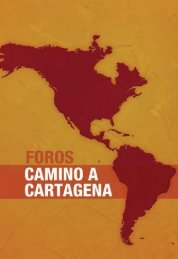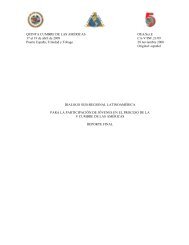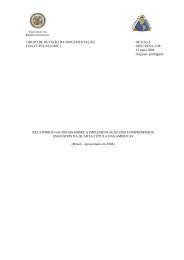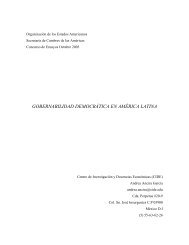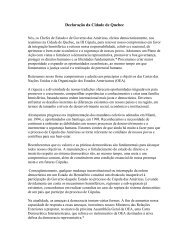The Road to Hemispheric Cooperation: Beyond the Cartagena
The Road to Hemispheric Cooperation: Beyond the Cartagena
The Road to Hemispheric Cooperation: Beyond the Cartagena
Create successful ePaper yourself
Turn your PDF publications into a flip-book with our unique Google optimized e-Paper software.
COMMENTARy by TED PICCONE<br />
Senior Fellow and Deputy Direc<strong>to</strong>r for Foreign Policy, Brookings<br />
Institution<br />
<strong>The</strong> ongoing and increasingly polarized debate around <strong>the</strong><br />
region’s shaky commitments <strong>to</strong> democracy and human<br />
rights are well addressed in Dr. Perina’s thoughtful paper.<br />
In addition <strong>to</strong> <strong>the</strong> examples he offers, fur<strong>the</strong>r evidence can<br />
be found in <strong>the</strong> decision of <strong>the</strong> OAS General Assembly in<br />
June <strong>to</strong> consider a raft of proposals <strong>to</strong> weaken <strong>the</strong> inter-<br />
American human rights system. <strong>The</strong>se are important signals<br />
of change in regional politics and diplomacy. First, <strong>the</strong>y<br />
connote a growing sense of self-confidence on <strong>the</strong> part of<br />
some leaders that <strong>the</strong>y can handle <strong>the</strong>ir internal human<br />
rights problems on <strong>the</strong>ir own. Indeed, some even reject <strong>the</strong><br />
basic principle of external scrutiny of <strong>the</strong>ir adherence <strong>to</strong><br />
legal and political instruments <strong>the</strong>y’ve endorsed. Second,<br />
<strong>the</strong>y demonstrate <strong>the</strong> solidarity among <strong>the</strong> ALBA states <strong>to</strong><br />
exploit certain decisions of <strong>the</strong> Inter-American Commission<br />
and Court on Human Rights as a wedge between Washing<strong>to</strong>n<br />
and <strong>the</strong> rest of <strong>the</strong> region. And third, it suggests <strong>the</strong><br />
moral, if not always legally enforceable, power of <strong>the</strong>se institutions<br />
<strong>to</strong> pressure governments <strong>to</strong> improve <strong>the</strong>ir human<br />
rights records remains effective.<br />
Reforms <strong>to</strong> <strong>the</strong> Inter-American Democratic Charter are<br />
sorely needed. But as <strong>the</strong> paper explains, <strong>the</strong> current political<br />
and ideological stalemate around <strong>the</strong>se issues will<br />
stymie any significant action. Similarly, advocates for an<br />
effective regional human rights system are on <strong>the</strong> defensive<br />
after years of progress. Considered by many experts<br />
as one of <strong>the</strong> strongest features of <strong>the</strong> inter-American architecture,<br />
<strong>the</strong> Inter-American Commission and Court on<br />
Human Rights have developed an important body of jurisprudence<br />
that has made a difference for victims of human<br />
rights violations throughout <strong>the</strong> region. Commissioners<br />
have tended <strong>to</strong> be well qualified and relatively independent<br />
of <strong>the</strong>ir governments, and more often than not, Court<br />
decisions are respected.<br />
A series of troubling developments, however, has raised<br />
concern that this positive situation is changing due <strong>to</strong> some<br />
states’ attempts <strong>to</strong> constrain <strong>the</strong> Commission’s independence<br />
and <strong>to</strong> avoid implementing its decisions. Underfunding<br />
of <strong>the</strong> system also remains a chronic problem. <strong>The</strong> creation<br />
of an OAS working group in 2011 for <strong>the</strong> ostensible<br />
purpose of recommending ways <strong>to</strong> streng<strong>the</strong>n <strong>the</strong> mechanism<br />
has become, instead, a forum for undermining it. <strong>The</strong><br />
renewed commitment <strong>to</strong> increase financial resources <strong>to</strong> <strong>the</strong><br />
human rights bodies from <strong>the</strong> OAS regular fund is <strong>the</strong> silver<br />
lining in an o<strong>the</strong>rwise s<strong>to</strong>rmy sky that continues <strong>to</strong> threaten<br />
<strong>the</strong> future of <strong>the</strong> body.<br />
Attempts <strong>to</strong> constrain <strong>the</strong> independence of commissioners<br />
are a particular concern. A proposal <strong>to</strong> establish a code of<br />
conduct <strong>to</strong> regulate <strong>the</strong> Commission’s rapporteurs, a tactic<br />
borrowed from states seeking <strong>to</strong> hamstring <strong>the</strong> independent<br />
experts of <strong>the</strong> U.N. Human Rights Council, is one example.<br />
A plan <strong>to</strong> prevent <strong>the</strong> Commission from publishing its annual<br />
review of freedom of speech, which would directly undermine<br />
<strong>the</strong> Rapporteur for Freedom of Expression, is ano<strong>the</strong>r.<br />
Secretary General Insulza proposed letting governments<br />
delay publication of <strong>the</strong> Commission’s critical country reports<br />
for as long as a year, and allow <strong>the</strong>m a right of reply.<br />
<strong>The</strong> recent case of <strong>the</strong> Belo Monte hydroelectric plant in Brazil<br />
offers a dramatic illustration of <strong>the</strong> controversy sparked<br />
by <strong>the</strong> Commission’s decisions. In April 2011, in response<br />
<strong>to</strong> a request by indigenous communities in Brazil, <strong>the</strong> Commission<br />
issued precautionary measures that included <strong>the</strong><br />
immediate suspension of construction of <strong>the</strong> utility. Brazil’s<br />
exaggerated response included <strong>the</strong> withdrawal of its ambassador<br />
<strong>to</strong> <strong>the</strong> OAS and its candidate <strong>to</strong> <strong>the</strong> Commission,<br />
and a refusal (since overturned) <strong>to</strong> pay its annual quota.<br />
A similar attitude can be observed in o<strong>the</strong>r leaders who reject<br />
compliance with <strong>the</strong> Court’s and Commission’s decisions.<br />
President Chávez, upon learning of a Court decision<br />
against his government, stated that it was “worth nothing”<br />
and chose <strong>to</strong> ignore it. In a similar vein, <strong>the</strong> secretary general<br />
suggested that <strong>the</strong> Commission’s precautionary measures<br />
“are simply recommendations that states can or cannot<br />
respect” and suggested <strong>the</strong> Belo Monte measures be<br />
revised, which some considered a political interference in<br />
<strong>the</strong> system’s au<strong>to</strong>nomy. Peru joined <strong>the</strong> chorus for reform<br />
in protest of a Commission suit regarding a botched hostage<br />
rescue in Lima in 1997. President Rafael Correa of<br />
Ecuador, upset over <strong>the</strong> Commission’s decision <strong>to</strong> suspend<br />
a libel sentence against newspaper edi<strong>to</strong>rs, has even suggested<br />
CELAC break with <strong>the</strong> Inter-American Commission<br />
on Human Rights in favor of a new one exclusively for Latin<br />
America.<br />
<strong>The</strong> <strong>Road</strong> <strong>to</strong> <strong>Hemispheric</strong> <strong>Cooperation</strong>: <strong>Beyond</strong> <strong>the</strong> <strong>Cartagena</strong> Summit of <strong>the</strong> Americas<br />
<strong>The</strong> Brookings Institution ❘ Latin America Initiative<br />
88



